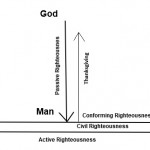
Post by Nathan Rinne
Note: what follows deals with the “worship wars” in my denomination, the Lutheran Church – Missouri Synod (see the second paragraph here for more resources about that). I think that it might have much wider applicability as well though!
In John 6:66 we are told that many of his own disciples went away from Jesus after he explained to a crowd that without eating His body and drinking His blood persons cannot have eternal life: “As a result of this many of His disciples withdrew and were not walking with Him anymore.”
I have always appreciated how Jesus does not say something like: “Wait! Please come back! Let me explain it better to you!”
After all, does this mean that He did not love these persons? Of course not. It just meant that His message and mission was clear and that He was not going to compromise.
Lutherans – particularly those who are keen to add the adjective “confessional” – typically have a tendency of being stubborn when it comes to our message and mission. I actually don’t think that’s a bad thing – particularly in a culture that is, morally speaking, screaming “change already!” at us. And yet, eager to be like our Lord, there are undoubtedly times we are not so eager to recognize that we ourselves – as opposed to our message – are becoming a stumbling block.
I want to concede that this is a problem. Snark and sarcasm, for example, may have their place, but one must be wise (see Titus 3:1-2, for example). Lutherans who believe the Scriptures are the word of God – and who might choose to emphasize the adjective “missional” – would not be wrong in pointing this out.
And here is where I want to say the following:
“Yes, please do condemn my lack of love for the lost. Fire away. For my heart is indeed to be as my Lord’s and I need to hear this word of Law. To be holy means, in part, to seek the lost as did our Shepherd. Nail me to the wall (not without absolution though!).”
Indeed. The words of an Eastern Orthodox prayer: “Lord, do not let them perish through me, a sinner” – these words should indeed give me pause (also think of Paul’s terrifying words in Romans: “the word of God is blasphemed because of you….”). For I need to hear about how I have squandered my time, how I have elevated frivolous concerns to the fore, how I have failed to really listen and show concern for those around me. I need to hear hard words about my tendency to see persons as interruptions instead of blessings. I need to hear how I, unlike the Good Samaritan, have not met the physical and spiritual needs of those God has thrown in my path. Even starting with those who I love the most (and should love the most!), not the least!
Perhaps you can identify with me.
And I also hope that any Lutherans – whatever their preferred adjective – can also say “Amen” to what Dr. Luther says here:
The Word of God is not yet as powerfully at work as it should be and as we wish it to be. We have no one else to blame for this than ourselves: We are too lazy to ask God for sharp arrows and burning coals. He commanded us to ask for his kingdom to come and his name to be hallowed, that is, we should ask for his Word and Christendom to increase and grow strong. However, because we leave things the way they are and do not ask earnestly, people are so lazy and the arrows are dull and tired; the coals cold and raw; and the devil does not fear us yet. Therefore, let us wake up and be eager. The time is now. The devil plays his dirty tricks on us everywhere. Let’s prove something to him for a change and rain on his parade. Let’s get our revenge, that is, let us ask God without ceasing until he sends us enough ready soldiers with sharp arrows and burning coals. (Vol. VI, Wittenberg ed., p. 372) Luther’s Bible Treasures, Lutheran Press, Minneapolis, 2015
But when I say all of this am I also saying that the church should change its traditional practices – in particular as regards its worship practices? Is this necessary to our Christian mission?
I am not. Even as I urge you to lovingly point out my lack of love for the lost, please do not condemn me for not falling over myself to produce Gospel-enveloping “culturally savvy tortillas” – that I think often actually work to mitigate the simple and humble forms of the Gospel (see 2.2 and 2.3 here) – in the hope that this or that “target [market]” will pick it up….
Our Lord certainly does deeply enter into our worlds that He might speak truth to us. That does not mean, however, that what we do in His house – that house which we treasure and long for – should necessarily be modified to accommodate what others do in theirs. Especially when it can, rightly or wrongly, give the impression of desperation! (insofar as we are saints, we have a real and godly love for the lost and a desire for proper “cultural accommodation” and insofar as we are sinners, we are desperate “pleasers of men” and their passions).
For to be holy especially means to love one’s brothers and sisters in Christ, and to value that which has been passed on from generation to generation.
I recently read an article from Pastor Jordan McKinely in which he said the following:
Dr. Naomichi Masaki of the [LCMS’s] Fort Wayne seminary asked the question in one of my classes, “Whose liturgy is it?” If it’s about preference, it’s yours and mine to do as we see fit. If it’s the church’s liturgy as it has developed from the time of the Apostles (Acts 2:42)–and even from the time of the Old Testament prophets (Psalmody, anyone?), we really should show greater restraint in changing what is done. After all, don’t we say in the creed, “I believe in one, holy, Christian [catholic] and apostolic church?” The liturgy is the possession of the whole church. Who am I to exercise my preference in the matter? Yes, it has room to shrink, grow, or change, but it shouldn’t be based on preference. I suppose I don’t get much of a voice because I’m white and married to a German (being of Scottish heritage doesn’t gain me any points, does it?), it’s going to sound like I’m advocating an emotionless, Germanic traditionalism. You don’t have to listen to me, but you should listen to Dr. Masaki, who isn’t German, nor is he emotionless. (see here)
Can this not certainly communicate to the lost love as well?: in that they can clearly see that we value these salutary convictions of all our brothers and sisters that have gone before us? (not to mention the sometimes-hard-to-love among us now!) Namely the convictions about an “order of service” that, in form, humbly and simply proclaims the humble and simple Gospel of our Lord?
I think that is most certainly true! And, hence, we ask them to join our happy throng – the household of God! Come and share the treasures that we have in the Lord’s house!
FIN
P.S. – I am eager to talk about this in a patient and civil way, per this great new article in the LC-MS’s official magazine, the Lutheran Witness. Maybe you think what I have posted here is limited in its view or needs to address this or that “bigger picture”. I would like to hear what you have to say – please talk with me.
Image: http://upload.wikimedia.org/wikipedia/commons/8/87/Hole_zachaeus_in_tree.gif












